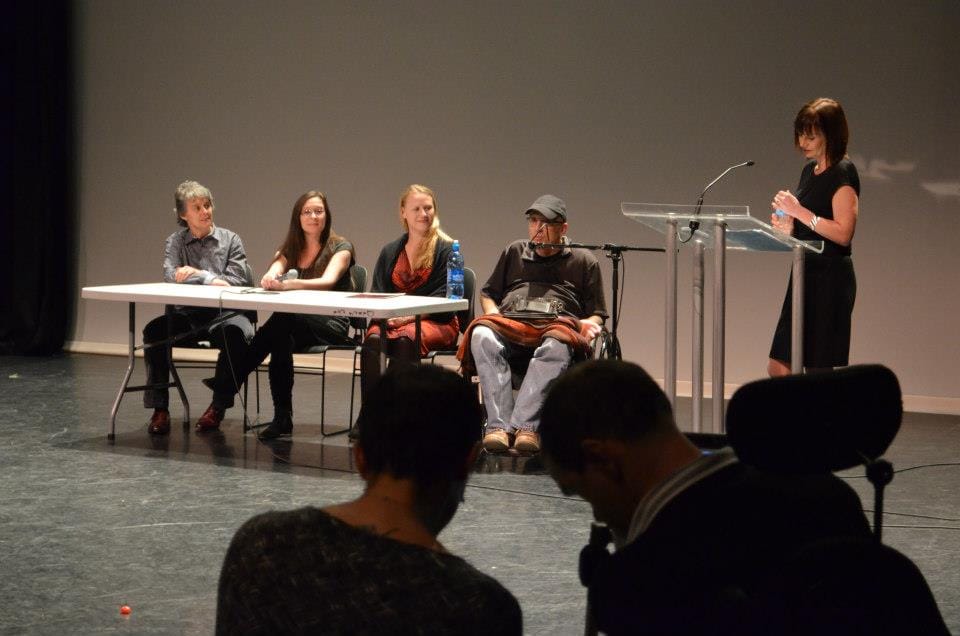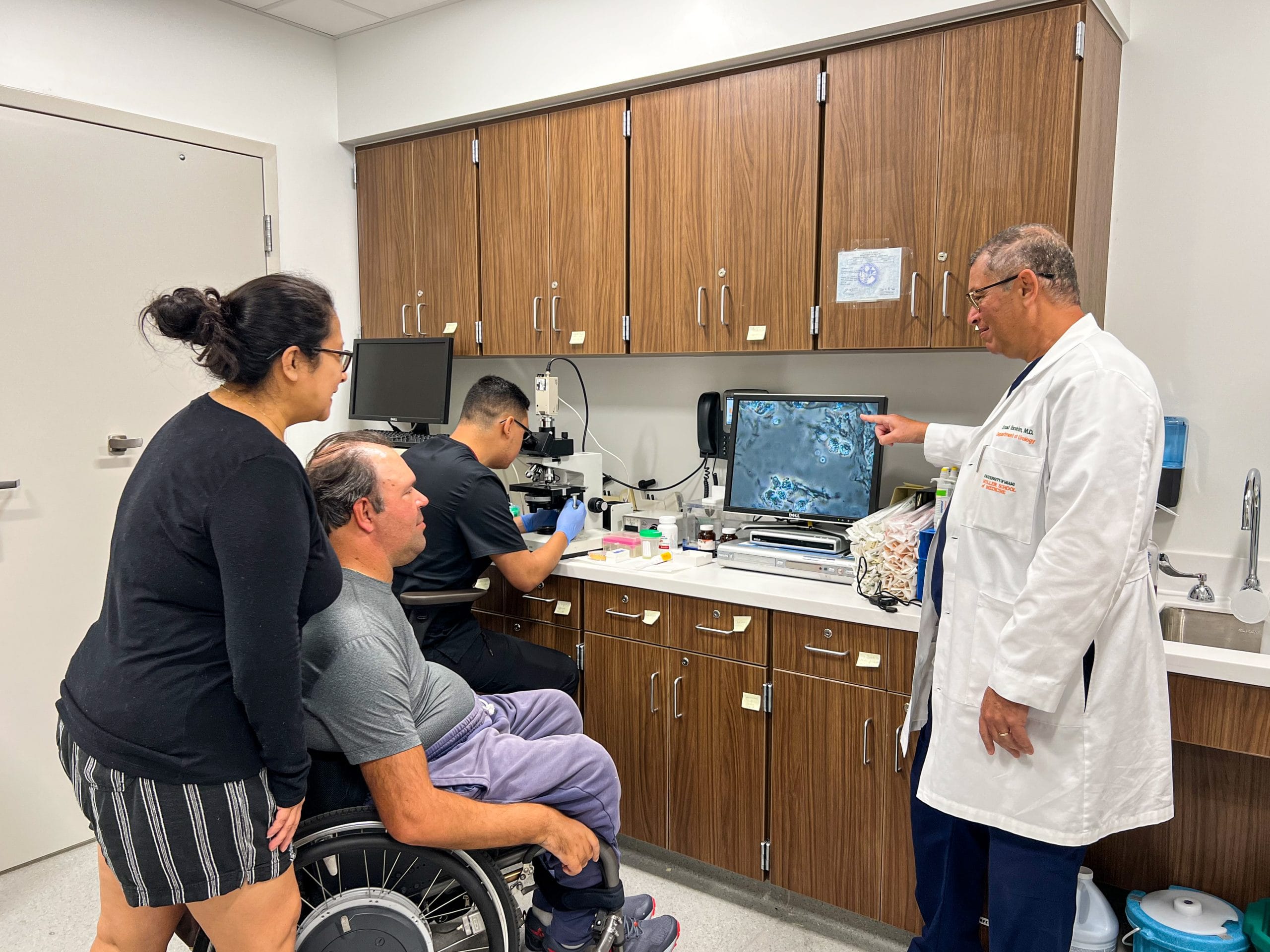The disability community, health care workers and sex workers join forces to help break down barriers to intimacy for people with disabilities
This Saturday, for the first time in Vancouver’s history, members of the disability community came together with health care workers, legal experts and sex workers to discuss the stigmas associated with sex and disability.
Around 130 people attended the event, which was funded by Spinal Cord Injury BC (SCI BC), The Disability Foundation, and the founders of Equitable and Accessible Sexual Expression (EASE).
Trish St. John, the founder of Sensual Solutions, a sensual coaching agency, was also in the audience.
The evening centered around the screening of the award-winning Australian documentary, Scarlet Road, which depicts the life of activist and sex worker, Rachel Wotton, who specializes in providing sexual services to those with disabilities.
Wotton was in attendance and engaged with the audience during a panel discussion after the film. The panel also included Dave Symington, a person with quadriplegia and co-founder of EASE, Marie Carlson, a sexual health clinician, and Kerry Porth who is a former sex worker, member of EASE and board chair of the Pivot Legal Society,
The panel discussed the sensitive balance that must be found between respecting and supporting the sexual lives of adults living with disabilities, and respecting the rights of sex workers, health care workers and attendants.
Dave Symington, co-founder of EASE, believes discussions like these are necessary to increase access to sexual expression for those with disabilities. “There’s a perception in our society that people with disabilities aren’t sexual beings, but that’s just not true. Intimacy and sensual touch have huge therapeutic benefits, and we need to educate the health care community and sex workers on how to safely deal with this issue,” he says.
“We’re working with EASE and the Disability Foundation to put on this event because we recognize that access to intimacy and sensual touch are essential to living a fulfilling adult life,” says Chris McBride, the executive director of SCI BC.
Duane Geddes, the executive director of the Disability Foundation, agrees: “Scarlet Road may be based in Australia, but this is a universal story, and we need to find local solutions to help people with disabilities explore their sexuality as they see fit,” says Geddes. “This is an issue that affects all of us in some way, and we’re happy to be working with our community partners to make this event happen.”
Kate McBride, the sexual health clinician who facilitated the panel discussion, says events like these are hugely beneficial for people in her field. “There’s a big demand in the health care community for guidelines on how to safely and ethically deal with sexual health and intimacy in a clinical setting,” says McBride.
“It’s a difficult issue to navigate, but that’s why so many health care workers are here tonight. At its core, sexuality isn’t just about pleasure, it’s about quality of life and health, and this film represents that really well.”
The feedback from the audience was overwhelmingly positive. Crash Cooper came to the event with a friend. He uses a wheelchair as a result of multiple sclerosis. “It was a terrific event and I’m so stoked that I was able to come,” he said, “Thanks so much for doing this.”
Resources related to sex and disability
For people with disabilities:
1. Talk to someone: The Sexual Health Rehabilitation Service at GF Strong Rehabilitation Centre and Blusson Spinal Cord Research Centre, provides a confidential, supportive environment for you to explore and address your concerns around sex and sexuality. We are a team of Rehab Nurses (and consulting Sexual Medicine Physician) who specialize in the area of sexual health and disability/chronic illness.
Call 604-737-6233 to get a referral.
2. SCI-University is an online resource for persons with spinal cord injury and their families. Two of the learning modules are about sexuality and reproductive health
3. The PleasureAble manual – A sexual device manual for persons with a disability
4. Spin Magazine’s Autumn Edition featuring the article Partner’s for Pleasure – improving intimacy options for Vancouverites.
For Health Care Professionals:
1. Supporting Sexual Health and Intimacy in Care Facilities: Guidelines for Supporting Adults Living in Long-Term Care Facilities and Group Homes in British Columbia
Developed by a group of expert writers through the generous funding support of the Ministry of Health and the Public Health Agency of Canada, these Guidelines are intended for care facilities, including nursing homes, group homes and assisted living settings in British Columbia, but may be useful in other settings as well.
An 18-page Pocket Guide version of these guidelines is coming soon! Visit www.sci-bc.ca on May 1st to download your free copy.
2. The Sexuality and Access Project looks at the taboo around talking about sexuality, particularly in the context of persons with a disability who use attendant care. Spearheaded by Fran Odette and Cory Silverberg, this project began with the survey of 464 attendants and attendant care-users about their experiences.
3. Questions and Answers: Sexual Health Education for Youth with Physical Disabilities, published by the Public Health Agency of Canada
4. NEW COURSE: Accredited Sexual Health Rehabilitation Education Available Online! This new and exciting course offered through the British Columbia Institute of Technology takes a comprehensive look at the causes and impacts of sexual health dysfunction resulting from injury and chronic illness or disease. This course is 12-weeks, self-paced, available online and is the introductory course in a planned sexual health rehabilitation certification. The second course will be available online beginning April 2013.
5. EVENT: “Taboo Topics in Residential Care” May 27-28, 2013 – Segal Centre, SFU Vancouver Campus, 515 W Hastings St, Vancouver, Canada.
This conference focuses on difficult-to-deal with issues like residents hurting other residents; theft and financial abuse; neglect and exploitation; alcohol, drug and tobacco use and abuse in institutional settings; and sexuality.
6. “Sexuality, Disability and Chronic Illness: The What, How and Why of Sexual Health Rehab” Offered during the Canadian Association of Rehabilitation Nurses biennial conference, this workshop is facilitated by the team in the Sexual Health Rehabilitation Service on May 29th from 8 am to 4 pm.
Highlights include: a review of principles and practices in Sexual Health Rehab, current research and guidelines, and “take home” or rather “take back to work” practical suggestions for incorporating sexual health into your practice.
A movie screening of the internationally acclaimed Australian film “Scarlet Road” will be offered after the workshop.




